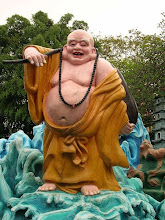During the chai stop at the ancient temple complex of Srirangapatnam, someone asked Amma, "What is our patience, is mistaken for weakness, and we are consequently exploited?"
Instead of answering, Amma asked members of the tour group to respond. One westerner spoke about how he feels that any quality expressed will beget the same quality. Thus, expressing patience, for example, will beget patience from others. This he said, was the principle that governed his interaction with others. He then gave the example of how auto-rickshaw drivers overcharge him sometimes, seeing him as easy prey. Nevertheless, he would exercise patience and pay in the hope that the rickshaw driver would later feel repentant and thus stop his wrongdoing.
In response, Amma disagreed with him. She said that pointing out adharma (unrighteousness) was also one's dharma, or duty. She said that only one or two in a hundred rickshaw drivers might feel repentance or regret for cheating others; most would be motivated to continue exploiting others. Amma then presented a few hypothetical scenarios of what could go wrong. The next passenger might be a poor man. Or a ruthless rickshaw driver might kill a bank employee carrying large amount of cash. The driver might be jailed for life. By being a passive accomplice in the rickshaw driver's cheating, the Westerner would be guilty of fostering adharma. Not only that, his actions would have paved the way for murder of an innocent man (the bank employee) and the consequent suffering of his wife and children, in addition to the life-long suffering of another in prison.
Amma stressed that spiritual aspirants must assiduosly cultivate patience. However when they step out in the world, they must ensure that their actions do not unwittingly foster or encourage unrighteousness.






















No comments:
Post a Comment